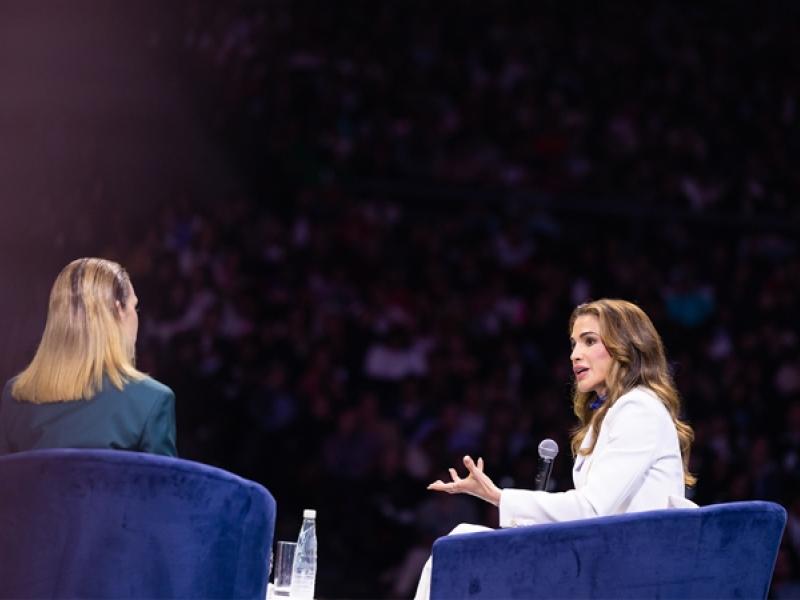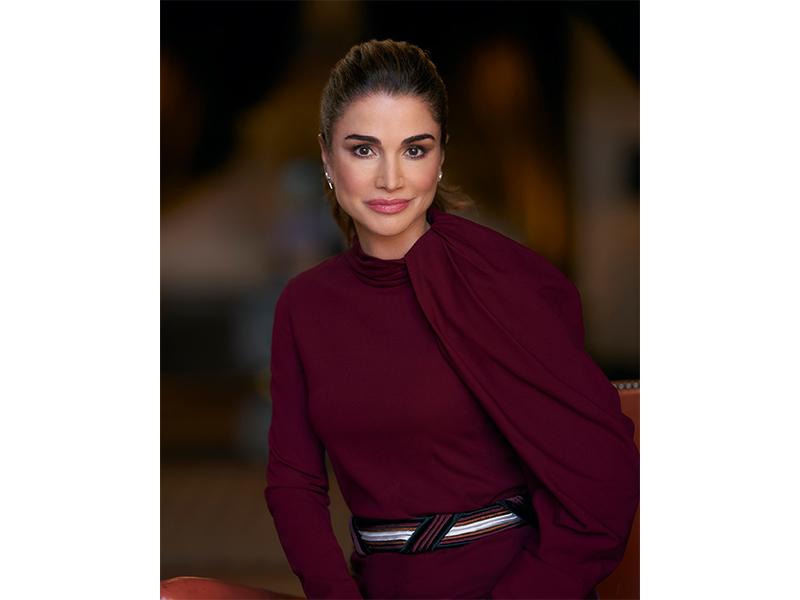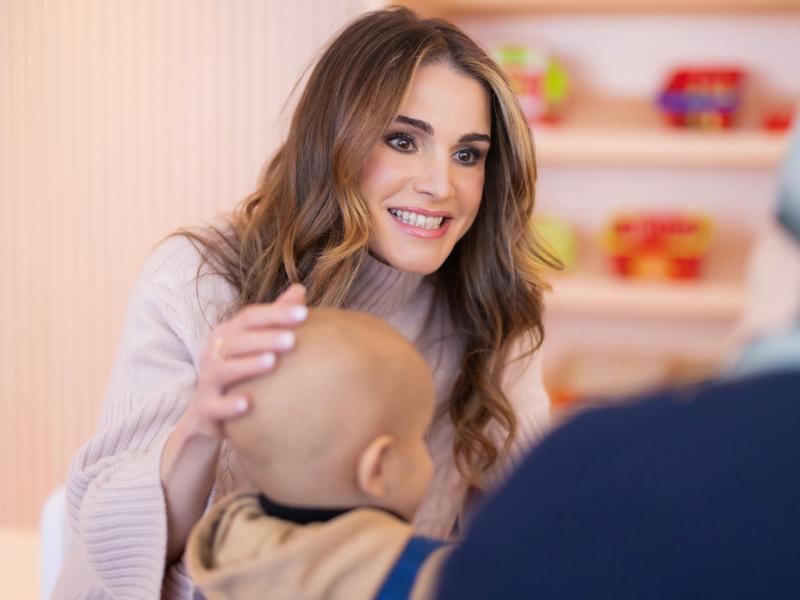Françoise Crouïgneau: Your Majesty, we know of your commitment to cross cultural dialogue. What is your main message : to fight against misunderstanding, stereotypes and intolerance? To fight against poverty and violence and, at the end of the day, for peace?
Queen Rania: I believe many of these issues are inter-related…but, yes, I’m deeply committed to building greater understanding between people of all cultures, religions and backgrounds… showing people that we have so much in common… regardless of race, religion, color or creed, people share the same concerns and values.
We are seeing a visible rise in intolerance and violence around the world… and that is a global challenge that we have to face together. Less visible, but potentially more damaging, are the dangerous undercurrents of fear and suspicion which are pulling people apart. It is then that we risk people choosing isolation over integration.
That’s really heartbreaking because at the end of the day, we all belong in some sense to East and West - and East and West are neighbors. Good neighbors do more than live alongside each other – they live together.
But living together takes hard work. Living in the same neighborhood is not multiculturalism. We need to invite that neighbor into our homes, our heads, and our hearts. It’s a cultural conundrum. If you trust someone, you let them into your home and learn more about them, but if you don’t trust them, you don’t let them in, and you’ll never learn about them. Mutual trust and knowledge go hand in hand.
Françoise Crouïgneau: What are your priorities in this respect? A dialogue between oriental and occidental academics, between religions? Between politicians?
Queen Rania: If we are to build a better world, there needs to be greater dialogue at all levels of society: from business and government, to civil society. We must start by building bridges of friendship… asking the right questions… and listening to the answers that underpin trust and connection.
And it’s so important to nurture those instincts of mutual trust and respect in our children…at home in their families and in schools with their teachers and friends.
Françoise Crouïgneau: What kind of actions could be implemented in social and/or educational contexts?
Queen Rania: I think education is vital in combating intercultural misunderstanding. If we nurture our children, and cultivate within them the seeds of trust, tolerance and compassion, we will ultimately strengthen our global family.
And given that our global family comprises the largest ever youth cohort, then youth must be an important part of the solution. One area in which we must engage youth is interfaith and intercultural dialogue. We need to educate young people about all religions, not just their own. And teach them to identify the danger signals indicating that religion is being used to justify hatred, cults or violence; then, creating opportunity – jobs, educational exchanges, internships - for our youth must be the overriding motivation in everything we do because they are the catalysts for real change.
Françoise Crouïgneau: How has globalisation changed cross cultural dialogue? Is it an obstacle, as too many traditions are involved, or a chance to be taken to a global audience?
Queen Rania: One of the upshots of globalization has been the plethora of communications tools we now have at our fingertips.
At the click of a button we can see what’s happening half way around the world; we can be authors of content or producers of films that millions read, watch and respond to. In fact, I’ve recently set up a YouTube account (http://youtube.com/QueenRania) because it’s such a great platform for dialogue and exchange. I’m asking YouTubers to join me in breaking down damaging stereotypes of the Arab world which, for too long now, have maligned my region and its people. I hope to show YouTubers everywhere the truth about the part of the world I cherish and call home.
And as we exchange knowledge, we forge friendships in the process…virtual handshakes are extended, and new paths of understanding and acceptance are formed.
But there is another side to globalized communications which is that, too often, people have information without context, and contact without communication, so that these tools for enlightenment can also, sadly, be engines of despair and hate.
We must use the gift of new technologies and information at our disposal responsibly, and move beyond understanding and towards acceptance of our cultural and religious differences.
Françoise Crouïgneau: Why does the gender gap still exist in so many countries around the world?
Queen Rania: It’s down to many factors. Gender injustice is entrenched in social and cultural norms all around the world. It manifests itself in different ways, and at different levels, but women in all countries face disadvantages: low political participation, less access to education and health facilities, exclusion from the workforce etc.
I think it would be a tragedy to continue to witness so many inspiring and capable potential leaders failing to fulfill their potential – simply because they are women. Closing the leadership gap between men and women is one of the greatest challenges of this century.
And it isn’t just a tragedy for individual girls and women. It’s a terrible loss for the whole world. When half of a society’s talent base is neglected and wasted, development suffers, progress is stunted, and everyone pays the price.
Thankfully, the issue of gender equity is beginning to be taken seriously by leaders. We see it, for example, in the Millennium Development Goals, which explicitly focus on women’s development concerns like girls’ education, gender equality, and maternal health.
But I still think we have a long way to go at the national and local government level in many countries around the world – whether we’re talking about development challenges, or issues like job equality, maternity leave, and childcare.
Françoise Crouïgneau: How can cross cultural dialogue help to get rid of gender inequity? In your own country, in the Arab world, on the international scene?
Queen Rania: Well, overcoming this challenge of gender inequity is partly to do with cross-cultural dialogue, but it’s also about dialogue within specific countries, between women, and between men and women.
There’s no silver bullet to solve gender injustice…rather, it’s about tackling the roots of gender bias. To do that, we need to educate both men and women; we need to reach out to girls and boys in primary schools, and we need to spotlight successful role-models to inspire women everywhere.
Many of the challenges faced by Arab women are faced by women all over the world. Of course, we have our own set of idiosyncrasies, chief amongst them being the belief that women should be wives and mothers first and foremost, versus career women.
But change is happening. As a society we invest heavily in women. The Arab world has made, and is making, tremendous progress in bridging the gender gap in education and health. In fact, according to the World Bank, the Middle East is one of the biggest spenders on education, and in many Middle Eastern countries, the majority of university students are female.
The problem is what happens after these ambitious young women graduate. Women’s participation in the workforce is still low but it’s not negligible. We have women who are first class honors Engineering graduates, judges, CEOs, doctors, mothers, teachers, female ministers…
It is these women who are steadily, proudly, and quietly eroding negative stereotypes. And as they do, they’re breaking a path for the next generation. This is what we need the media to write about…instead of focusing on the negatives!
The Arab public increasingly understands that our region will never get ahead if half of our population is held back. A Gallop poll notably showed that the majority of men across Muslim societies agree that women should be allowed to vote without influence, work at any job for which they are qualified, and enjoy the same legal rights as men – that includes Saudi Arabia, the only country surveyed in which women are not allowed to vote.
Today, Arab public opinion firmly supports equal rights. I’ve always said that laws alone are not enough…to instigate real change we need to challenge cultural mindsets, and implant strong awareness of gender equality amongst legislators, implementers, and society as a whole.
In a nutshell, we’ve gone a long way towards challenging gender bias, but we still have a long way to go.
Françoise Crouïgneau: What are your main roles as the Queen of Jordan: explaining all around the Middle East the progress made in your own country and the progress still to be done? Is it to explain to the world that, even in a tormented region like the Middle East, everybody can help old rivals to understand better each other?
Queen Rania: Like any position, the job description for “Queen” changes with the times. Ten years ago, for example, the need for cross-cultural dialogue was not as pertinent as it is now. Now, it is an integral part of my work.
One of my most important duties, along with my husband is to communicate the message of Jordan and its people to the rest of the world. We want people to know what I like to call ‘the other Middle East’. They would not see a region full of the negative images which too often fill the television screens. Rather, they would see in Jordan a land rich in culture, full of potential and populated by peace-loving, citizens. This is the Arab and Islamic world which I know and cherish.
And there are some ceremonial obligations with this job too…for instance, state visits, and accompanying my husband to the opening session of parliament among others.
But actually, I never think of my work as a duty per se. Fate has dealt me a powerful hand…I feel blessed because this position allows me not only to connect with so many people…but to listen to their aspirations…understand what they need, and do what I can to make a difference in their lives.
Françoise Crouïgneau: What worries you? What gives you cause to hope in the future?
Queen Rania: What worries me? The ongoing conflict between the Palestinians and Israelis worries me. It is taking such a heavy toll on children…robbing them of their childhoods, crushing their spirits, and suffocating their dreams. We must bring the dreadful nightmare to an end. It is time for new engagement. The siege must be lifted. The killing of civilians has to stop, on both sides. Children deserve to grow up in peace, on both sides. And leaders on both sides, supported by the international community, must join in the kind of honest dialogue that is the only viable path toward lasting peace.
What gives me cause to hope? Well as you may know, youth represents two thirds of the Arab world and when I travel around Jordan and the region, and meet youth from all walks-of-life, it never ceases to amaze me just how energetic, driven, ambitious and optimistic they are.
More than that, they are establishing so many diverse and innovative initiatives, attesting to their entrepreneurial spirit…from community radio stations at universities to jewelry workshops to boutique public relations firms to the emergence of serious, thought-provoking media publications.
And I’m also very proud of the rise of youth volunteerism and youth leadership associations which not only shows that our young people are taking control of their individual futures but that they are influencing the agenda of our collective futures.
© Copyright, Les Echos Newspaper



